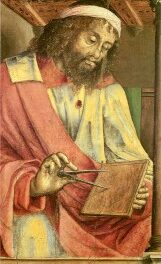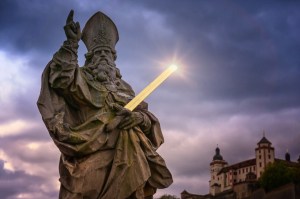We support our Publishers and Content Creators. You can view this story on their website by CLICKING HERE.
Each of us belongs to two States—a terrestrial State whose end is the common temporal good, and the universal State of the Church whose end is eternal life.
The Primacy of the Spiritual, by Jacques Maritain (Cluny Media, 254 pages)
1. Nothing is more important for the freedom of souls and the good of mankind than properly to distinguish between these two powers: nothing, in the language of the day, has so great a cultural It is common knowledge that the distinction is the achievement of the Christian centuries and their glory.
The pagan City, which claimed to be the absolute whole of the human being, absorbed the spiritual in the temporal power and at the same time apotheosized the State. Its ultimate worship of the Emperors was the sure consequence of an infallible internal logic. “Even the Christian Emperors and Constantine, the first of them, did not immediately repudiate certain symbols of divine honor, such as the building of temples and the celebration of games in their honor. The iconoclasts destroyed the images of Christ and the Saints at Byzantium, but respected the images of the Emperor. It was not until the fourth century that the Emperor Gratian gave up using the title of Pontifex Maximus. And to avoid running down the whole subsequent course of history, it will be sufficient to observe that by the blasphemous beast ‘come up out of the sea’ and the other beast ‘come up out of the earth,’ ‘that did great signs,’ both securing the adoration denied to the Lamb, the Apocalypse intends to symbolize the profaning and usurping civilization of all times and all countries”.
The Lord Christ said: Render therefore to Caesar the things that are Caesar’s, and to God, the things that are God’s. He thereby distinguished the two powers and so doing emancipated the souls of men.
2. Every act of ours may, according to different formal aspects, be referred at one and the same time to the particular good of ourselves or our neighbor as an individual, to the common good of the family or the State and to the transcendent common good of the whole universe, that is to say, to God Himself. Hence three hierarchized ordinations concerning respectively the “monastic” in Aristotle’s phrase or private ethics, the “economic” or politics, both branches of social ethics—and morals or general ethics dominating and enveloping the whole.
The State being the most perfect natural community (that is to say, the most capable of being self-sufficient) which mankind can form in this world, it is of supreme importance to draw the distinction and define the relations of subordination between politics, which are ordered to the whole of the terrestrial State as to their proximate and specific end, and ethics which are ordered to the divine transcendent whole. The subordination of politics to ethics is absolute and even infinite, being based on the subordination of ends; for the good of the State is not God Himself, and remains far, far inferior to the supreme beatitude of man. “The subordination is such—it is indeed infinite—that the strongest expressions employed to indicate it will always be exceeded by the reality. The Ancients, even Aristotle himself, did not fully realize it, because they did not perceive with sufficient clarity that the supreme good of human life is God Himself. Christianity was needed to make that fully clear; and when the gift of understanding, whose specific function it is, shows the Christian that everything which is not God is annihilated before God—quidquid Deus non est nihil est, et pro nihilo computari debet—it shows him also that the end of politics is nothing in comparison with the end of ethics”.
The Ancients were no more successful in emancipating the free act from the ties which bind it to this world. Christianity was needed for the full realization that the free act, considered purely in its freedom and in the secret node wherein the moral universe is born, is bound by no tie to the world or consequently to the State which is parcel of the world, but solely to God, the primary free agent, and the created will, the second free agent; so that the secrets of the heart by their very nature escape the natural glance of the angels, and yet to the angels the whole spectacle of this world is due. Neither the Prince of this world nor any prince of the nations can know anything of the spiritual heaven concealed in the recesses of our being and containing the kingdom of God, regnum Dei infra vos est: Christ alone can penetrate it by His priestcraft—and after Him, by the Sacrament of Penance which entitles them to know such secrets, the priests of the New Law, covered with the Blood of Christ.
Although formally considered as part of the State, every act of his can be referred to the common good of the State, man, considered in the absolutely peculiar and incommunicable quality of his liberty and as ordered directly to God as to his eternal end, himself enjoying therefore the dignity of a whole (to a more eminent degree than the entire physical universe, because God is much more intimately the end of a soul than of the whole universe of bodies), under this formal aspect escapes inclusion in the political ordination: Homo non ordinatur ad communitatem politicam secundum se totum et secundum omnia sua.
3. But in that order of eternal life the individual is no more self-sufficient—even less—than in the temporal. By the very fact of being ordered to the beatific vision, he is parcel of a superior whole, of a State which is a much more perfect unit than the terrestrial State (inasmuch as it is one single mysterious body living with the supernatural life which it receives from Christ), and to which every member is much more closely bound than he is to the terrestrial State, for we need the terrestrial State for the normal development of our nature, not for participation in the essence of humanity itself, whereas none can be made to share, through sanctifying grace, in the divine nature without belonging either visibly or invisibly (sive re sive voto) to the Church; the angels are members of it no less than men, and when we have finally become gods by vision—ego dixi: dii estis—we belong to it more than ever, because it is essential for it to make us enter the company, through the life of grace, of the Blessed Trinity Itself. That State is truly divine, but no less truly human, and therefore visible, the continuation of the Incarnation in our midst—parts of it have been impressed in baptism on this earth with the seal of effective incorporation and all men are created for incorporation in it—its invisible head is Jesus Christ, its visible head he who was charged by Christ to feed His sheep; it is in the world—without being of the world and because it is not of the world—the seat of the spiritual power which directs it towards its end and of which the Pope, as Vicar of God, is the supreme depository.
Each of us, therefore, belongs to two States—a terrestrial State whose end is the common temporal good, and the universal State of the Church whose end is eternal life. “There are two peoples in one same enclosure, one same human multitude, and these two peoples give occasion for two distinct lives, two principates and a dual juridical system”. Towards the end of the fifth century, Pope Gelasius wrote that “there are two things by which this world is chiefly governed: the sacred authority of the pontiffs and the power of kings”. In the nineteenth century Leo XIII said likewise: “God has divided between the ecclesiastical and the civil power the task of procuring the well-being of the human race. He has appointed the former to divine, the latter to human things. Each of them is supreme in its own sphere (utraque potestas est, in genere suo, maxima); each is enclosed within perfectly defined boundaries, delimited in exact conformity with its nature and principle. Each is therefore circumscribed within a sphere in which it can act and move in virtue of its own peculiar laws”.
It is only too clear, however, that these two distinct powers are not on the same plane. One is above the other. The terrestrial State, being a moral whole, as such owes duties to God. In its own sphere it is subject to the universal temporal sovereignty of Christ; for Christ, as Man, received from God dominion “over the works of His hands” and “all things have been subjected under His feet,” and it is from Him that kings and the heads of States and every human power derive their authority; the State, as such, is bound to observe His Law and the precepts of His morality. As a moral and religious agent, it is, therefore, itself part of the Church. “The Emperor is in the Church, not above it,” said St. Ambrose. The State, therefore, is indeed sovereign in its own domain, but its domain is subordinate, so that its sovereignty can be neither absolute nor universal. There is only one universal absolute sovereignty, the sovereignty of the Creator. The sovereignty of the Church, universal through the whole range of salvation, is clearly more extensive and elevated than that of the State. To distinguish between the temporal and the spiritual is simultaneously to affirm the subordination of the former to the latter. Do not the divine words which are the root of the distinction indicate also the subordination? Render, therefore, to Caesar the things that are Caesar’s, and to God the things that are God’s: were the things that are Caesar’s not God’s things before they became Caesar’s?
Republished with gracious permission from Cluny Media.
Imaginative Conservative readers may use the code IMCON15 to receive 15% off any order of not-already discounted books from Cluny Media.
The Imaginative Conservative applies the principle of appreciation to the discussion of culture and politics—we approach dialogue with magnanimity rather than with mere civility. Will you help us remain a refreshing oasis in the increasingly contentious arena of modern discourse? Please consider donating now.
The featured image is “Saint-Séverin No. 3” by Robert Delaunay, This file was provided to Wikimedia Commons by the Solomon R. Guggenheim Museum as part of a cooperation project. The Solomon R. Guggenheim Museum provides images depicting artworks which are public domain or licensed under a free license, and is in the public domain, courtesy of Wikimedia Commons.

 Conservative
Conservative  Search
Search Trending
Trending Current News
Current News 






